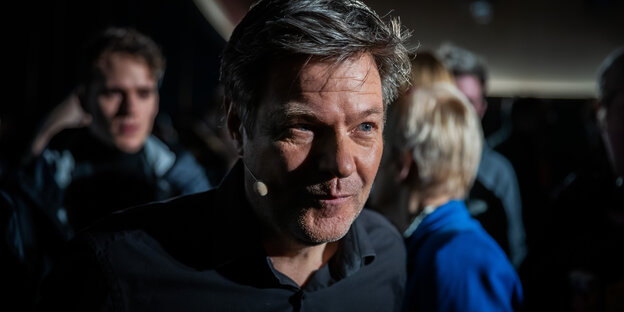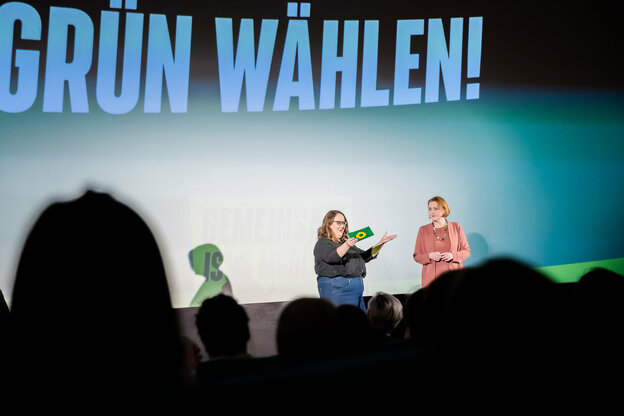Basically, the Greens have little at stake in the by-elections. However, they are fighting for votes: they need momentum for the super election year.

The most photographed during the Greens' election campaign on Tuesday: Vice Chancellor Robert Habeck Photo: Christoph Soeder/dpa/Picture Alliance
Robert Habeck, without a jacket and with his shirt sleeves rolled up, needs 15 minutes to warm up. In the first half of the speech he says: “I will now speak briefly about this mini federal election campaign that we are carrying out here in Berlin… well.” The sentence goes no further, the room In Prenzlauer Berg interrupted the vice-chancellor with a whisper.
Fifteen minutes later it is at operating temperature. “These big little federal elections can be a big exclamation point for election year 24!” Habeck shouts in the room. Then his speech becomes incomprehensible again due to the applause and shouts of “Woohoo”.
The Greens are taking the matter seriously. On Sunday the federal elections will be repeated in Berlin. Due to the chaos at many polling stations in September 2021, new voting will be held in some parts of the city, as ordered by the Federal Constitutional Court. In reality, there is not much at stake: the party would have to do very badly to end up losing a seat in the Bundestag. Most likely, a mandate will move from Berlin to North Rhine-Westphalia.
However, the Greens are gaining a lot of prominence in the fight for votes. In Prenzlauer Berg, one of their strongholds, they rented one of the city's largest cinemas for Tuesday night. At the end of the 2021 federal election campaign, chancellor candidate (can we say that again?) Annalena Baerbock is missing. Family Minister Lisa Paus, party leader Ricarda Lang and Vice Chancellor Robert Habeck will take the stage.
Chasing the momentum
One reason for all the effort: Berlin's small elections are just the beginning of a year with nine local elections, three state elections and one European election. In these years it can happen that one of the parties falls into a routine from the beginning and does not find a way out until the end. But it can also happen that you start with success and, inspired by it, rise higher and higher. The Greens once again long for a year like this.
“I want my party to be able to change this year in such a way that people can have hope,” says Robert Habeck on stage. A success on Sunday, despite all the headwinds of recent months? “What an exclamation point it would be to start this year!”

Ricarda Lang and Lisa Paus during the election campaign at the Colosseum cinema in Berlin Photo: Christoph Soeder/dpa
Only: This particular election campaign is also particularly demanding. Berliners had to repeat the elections to the House of Representatives last year. They are tired of voting. The relevance of Sunday's vote is not obvious at first glance. Added to this is the widespread discontent with the traffic light coalition. Green fortress or not: the cinema in Prenzlauer Berg is half full on Tuesday.
What components do you use to create an electoral campaign that provokes at least a hint of euphoria?
Hypothetical successes
The first thing the Greens will do tonight is try something very banal: highlight their own successes. Sometimes you have to remember that there are some of them even at traffic lights. Pankow MP Stefan Gelbhaar calls the 49 euro note “one of the greatest achievements of this legislative period”, while Family Minister Paus calls for the abolition of paragraph 219a of the abortion law. She gets a friendly applause for this, but nothing more for now.
This is probably also due to the fact that, alongside real successes, there are hypothetical ones: projects that the Greens would like to implement, but cannot push against their coalition partners. Paus talks about basic child welfare, which the Greens had conceived as an important social policy initiative, but which was scaled back in the cabinet and has been stalled in the Bundestag for months. The law is currently being “further improved” in Parliament, says Paus. This does not arouse any enthusiasm in the room either.
A glow fills the cinema for the first time after Paus, when the vice chancellor enters the stage: dozens of smartphone screens light up. Although Habeck feels shaken by the government, he remains in demand as a star among the Greens.
And what he is doing today: encouraging his party. He talks about the Bremen steelworkers, whose company meeting he attended the day before. An industry in transformation with an uncertain future. “The anger, the hatred, the rejection” would be “very obvious and understandable,” Habeck says. Instead, he experienced “an expectation” that the transformation would move forward. And “euphoria” when he finally agreed to support the renovation of the Bremen plant. “And I have experienced this several times in similar events: the expectation that something will happen, that something will advance.”
Negative energy is transformed into positive. This brings him back to the demonstrations against right-wing extremism, which many in his party see as a tailwind. The decision that this year could bring: “Success in putting right-wing radicalism and fascism in their place in Germany.”
A great ovation in the room. A bit of euphoria has now reached the cinema, before going out again into the rainy Berlin night.